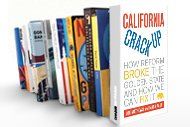
Joe Mathews and Mark Paul
230 pages | Buy this book
California is in serious trouble, and it's precisely because the state keeps trying to fix itself. Propositions and ballot initiatives, which are supposed to be democratic, instead end up at odds with each other and prove to be self-defeating. Mathews and Paul propose radically modifying the initiative process, replacing the current winner-takes-all electoral system with proportional representation, and ending supermajority requirements, which, they argue, prevent the government from doing its job.
What's the Big Deal?
With Meg Whitman and Jerry Brown vying for Gov. Arnold Schwarzenegger's seat this fall, Mathews and Paul's book is very timely. Proposition 11, which voters narrowly passed in November 2008, created a Citizens Redistricting Commission, which is currently redrawing the lines of legislative districts. Mathews and Paul's takeaway message, which is largely "California doesn't work because it can't work" (page 11), isn't a dead-ender, however. If Californians take the time to read the laws they're signing their names to at shopping malls and return accountability and trust to their state legislatures, there is hope for political efficiency and a way out of debt.
Buzz Rating: Hum.
The book received high praise from Pulitzer Prize–winning author Steve Coll and other writers who have tackled the messy subject of California's government. It received attention in The Wall Street Journal; from the radio show Left, Right, and Center; and from San Francisco Magazine.
One-Breath Author Bio
Mathews, a journalist, is a fellow at the New America Foundation, and Paul is a UC Berkeley visiting scholar and a former deputy state treasurer.
The Book, in Their Words
"At the heart of the civic moment is the fear that California lacks even a language, and an understanding, equal to its calamity. This book is meant to fill that need" (page 2).
Don't Miss These Bits
1. Though the state was initially touted as a "direct democracy" in the early days of the referendum, initiative, and recall process, its system of government is inherently undemocratic (page 29). Last year State Sen. Abel Maldonado was able to barter his vote on the budget in the early 2009 fiscal crisis with the passage of a ballot initiative, Proposition 14, that would likely not have passed otherwise. The initiative, recently passed by voters, will go into effect in 2011 and replaces partisan primaries with a "jungle" primary where the top two vote-getters (even if from the same party) advance to state and congressional elections. Though state law declares "logrolling" (or vote trading) illegal, and the senator spent roughly $2 million to bypass the legislature, the "police did not show up on the senator's doorstep," and citizens were largely unfazed (page 91).
2. Ballot initiatives, like prisons in California, have become big business. The signature-gathering firm Kimball Petition Management is just one of dozens of companies that have cropped up solely to gather signatures "outside shopping malls and grocery stores." The process allows individuals who sponsor initiatives to potentially have control over hundreds of millions of tax dollars and to launch political careers (page 70).
3. The budget is an enormous mess. As part of their solution, the authors propose a clear separation between local and state governments' roles. Voter-passed propositions and other conflicting legislation have alternated power over the budget and have led to a system under which no one is held accountable. The state's massive debt has mushroomed with growing budget deficits, and the number of IOUs issued to balance the budget has made California the state with the lowest credit rating (page 96). The authors suggest allowing the state legislature to do its job in taking care of "public universities, the courts, health care, and safety nets" for the elderly, poor, disabled, and jobless, while local governments would have control over "community-based services" like police, probation, jails, zoning, and other more localized services (page 158).
Swipe This Critique
California may soon enough be the national model for dysfunctional state governments, so it's important to catch the problems early. A Pew survey last year looked at which states resembled California—"It went without saying that any resemblance to California was a sure sign of peril" (page 185). The survey found that nine states also faced legal obstacles to balanced budgets, and placed five more on a watch list. Though California Crackup is overall a depressing book to read, Mathews and Paul offer words of hope in their epilogue.
Gradebook
Prose: Most of the book is engaging, except when the authors start talking about taxes and the budget crisis. Zzzzz.
Construction: After bashing the state hard enough to make anyone from Cali weep, the authors build it back up with a vision for the future and their grand plan to save California.
Bottom Line: A timely book with a lot of important things to say. Beware the dry stretches.
Uncommon Knowledge
Newsweek is committed to challenging conventional wisdom and finding connections in the search for common ground.
Newsweek is committed to challenging conventional wisdom and finding connections in the search for common ground.





